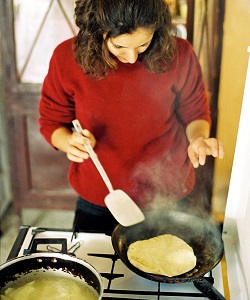
5 Reasons Freelancers Should Cook
The quick pop of eggplant yielding to the knife; the warmth of steam ghosting from the colander; the joy of turning over a chicken breast to find it richly brown.
What is more authentic and soul-stirring than cooking?
And that’s what this post is all about — the need of a freelancer to do all he or she can to maintain authentic experiences to renew one’s spirit during hard weeks of toil.
Some freelancers — with no 9-to-5 schedule and a work day that may seem to have no end — eat frozen meals from sad paper trays or order takeout or stop by the fast food place.
Some have spouses to cook for them — at least sometimes — and that’s a great aid in productivity in some ways. Some freelancers cook, but only if by that we mean warming up soup, boiling spaghetti, throwing cheese and sauce onto a bagel, and gassing up the old broiler.
By cooking, I mean preparing items from scratch, using a bit of creativity, and transforming and combining ingredients. Here are the ways in which cooking can enrich the life of, in particular, a freelancer, and how it stirs your soul.
1. A Freelancer’s Health
I’ll go out on a limb and guess you’re already on board with the notion that home-cooked meals are healthier than, say, Burger Monarch or Taco Knell (notice I’m not bad-mouthing any fast food chains…by name), but there are indeed recent studies verifying common sense.
Researchers at Johns Hopkins University’s Bloomberg School took a look at more than 9,000 adults over a period of years and found that eating home-cooking dinners led to consuming 140 fewer calories per day, along with less sugar and fat than those who rarely dined at home.
Everyone’s health is important to them, but freelancers tend to have a special relationship with health insurance, and we aren’t going to get paid sick leaves from our jobs. If you’re not working to bolster your health, you’re letting a component of your career slacken.
2. Problem Solving
Maybe the reason some people shy away from cooking — aside from the time consumption — is the apprehension of eating a bad meal. What is turmeric anyway? What does it mean to julienne? If you get things wrong, will you have a gloppy mess?
I don’t mind admitting that I’ve eaten a few bad meals in the name of being adventurous, winging it, seeing what would happen if. If you’re not an avid cook, spend a few years sticking to recipes. There are more than nine hundred tetramegabillion of them on the Internet.
But even if you’re doing that, cooking means problem solving. Why did the rice go dry twenty minutes before it was supposed to be done? Where’s that too-herby taste coming from? It wasn’t there last time. How do I get the potatoes cooked through in the skillet without burning them on the outside?
I love problem solving when cooking, and I don’t mind claiming that doing so has strengthened my problem-solving skills across the board. What freelancer doesn’t have to solve problems all the time?
3. Creativity and Brainstorming
I love cooking more than eating. I like chopping more than chewing. I don’t mind — too much — if a meal is a bit hard on some of my taste buds if it was fun to create.
Cooking is one of the most visceral creative experiences — transforming raw goods into a finished product whose qualities hit home to you in one of the most intimate ways possible.
Cooking can help with two seemingly opposite or unrelated issues: It can bring some expression into your life if your freelance work is tedious, or it can help you develop creativity you may need for your work.
Cooking, for whatever reason, is uniquely suited for causing the necessary ideas to pop into my head. It seems to prep the brain just perfectly, allowing the right level of concentration, with no other language information crowding them out.
4. Calming and Restoration
Whether you’ve experienced it or not, I’m sure you’ve heard people talking about the soothing effects of chopping and sifting and measuring, etc.
It’s true, and these things are as important to people whose livelihoods depend solely on their own efforts as to anyone. It’s a wonderful way to restore your mind and get ready for more work.
5. Good Breaks
Finding one’s mind wandering or running out of energy are only too common for freelancers of all stripes. We all struggle with what to do in little moments when our minds push away the work we’re doing.
Social media and similar web distractions can go on too long and don’t take us away from our computers. Other things might get us arrested.
Going to flip the steak in its marinade — or make the marinade, for that matter — is a wonderful quick break from writing, allowing you to stretch your legs and use your hands a little, getting you in a much-needed realm apart from your freelance work.
—
Ultimately, even if cooking is a bit time consuming, it’s been proven that there’s enough time to do it and still get enough freelancing done to pay the bills.
Eating food one has cooked oneself, and the cooking, are just too real and earthy to pass up. It’s a great way to keep yourself grounded and balanced.
Hi Jeff,
I’m a freelancer who just created an awesome meal of rice, tempe, tomato and bean sprouts, along with a delicious sauce. I cook daily and when we eat out, we enjoy local Balinese dishes served at warungs in the area. This means super healthy, high energy fare for our mind, body and soul, and this only helps us as freelancers. Take care of your body to take care of….you! Thanks much.
Ryan
Sounds like you live in a pretty sweet locale. Cook on, and thanks for reading!